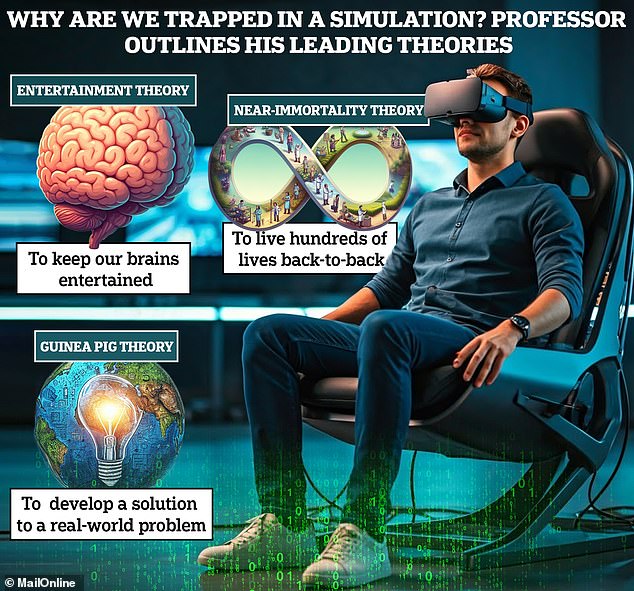In classic blockbuster film ‘The Matrix’, humans are enslaved by AI because it wants our body heat to power its computers.
While this sounds straight from the annuls of sci-fi, a physics professor says we may be living in a Matrix-style simulation.
Melvin Vopson, an associate professor in physics at the University of Portsmouth, thinks a series of daily clues suggest this world is not what it seems.
Now, he has tackled the hypothetical and philosophical question: If we are living in a virtual simulation, what is the purpose of it?
Speaking exclusively to MailOnline, he outlines three theories, including that we all chose at birth to become characters in an advanced AI world.
‘All these scenarios operate under the control of a master AI, created of course by a future iteration of our civilization,’ Professor Vopson told MailOnline.
‘It is possible that no one is awake anymore and we are trapped in the simulated reality, controlled by the AI.’
The so-called ‘simulation theory’ is popular with other figures including Elon Musk, who said the odds that we’re living in a ‘base reality’ – the real universe as opposed to a simulated one – are ‘one in billions’.

A physicist thinks we could be living in a simulation – and now he explains his leading theories as to why

In classic blockbuster film The Matrix, humans are enslaved by AI because they want our body heat to power their computers. Pictured, Keanu Reeves as Neo waking up in the real world
Professor Vopson – whose research focuses on experimental and theoretical studies of applied and fundamental physics – stresses that these three scenarios are speculation and not something backed by scientific research.
But some of his research at the University of Portsmouth have indeed indicated that the entire universe is a simulated construct or a giant computer.
The first theory is that we opted to enter the simulation at birth purely as a form of entertainment – to keep our minds amused and occupied.
The real world that we’ve chosen to leave behind is not very interesting, the theory goes, so humans created a much more interesting, albeit fabricated, approximation of life – the ultimate VR game.
And with its plethora of celebrity gossip, sports events, political scandal and more, the ongoing soap opera of modern existence is anything but boring.
‘We created the simulation as a place of entertainment where we can choose to enter (at birth) and experience a whole new life with all the components of it,’ Professor Vopson told MailOnline.
As for how we had the capacity at birth to make the decision to enter the simulation, it’s possible our consciousness would have made the choice before our new human was born.
The second theory is that the simulation can help humans as a whole ‘learn something’ that could provide a solution to a real-world problem.

Are we living in a simulated reality? Professor Melvin Vopson at the University of Portsmouth thinks it’s possible (file photo)
According to this so-called guinea pig theory, we may all be involuntary stuck inside the simulation for the greater good – the long-term benefit of humankind.
‘Imagine that our society has a complex issue to solve – environmental, economic, energy crisis, wars,’ Professor Vopson told MailOnline.
‘If we had the ability, the best way to solve it would be to run a simulation (or multiple parallel simulations) and see what solutions the simulated version of us come up with.
‘If any of the simulations crack the problem, then we can adopt it in the base reality as a viable solution.’
Lastly, the ‘near-immortality’ or ‘Narnia’ theory suggests that time in the real world moves much faster compared with time in the simulation.
For example, a single minute in the real world could last up to 100 years in the simulation, while one lifetime in the real world could be akin to 4.2 billion years, or over 52 million lives of lives in the simulation, assuming an average life of 80 years.
By opting to live in the simulation, we could experience multiple lives back-to-back, essentially achieving immortality.
‘A hundred life experiences could be just 100 minutes in the real life in the base reality,’ said Professor Vopson.

Melvin Vopson, an associate professor in physics at the University of Portsmouth, has already outlined the clues that suggest we live in a simulated reality

At a 2016 conference, Elon Musk said the odds that we’re living in a ‘base reality’ – the real universe as opposed to a simulated one – are ‘one in billions’ (file photo)
‘This is exactly how the time dilation works when we dream.
‘In the dream, the events that we experience can appear to last minutes, hours or days, but in the real conscious state the dream lasted in fact fractions of seconds.’
Professor Vopson has already outlined clues that suggest we live in a simulated reality.
The fact there’s limits to how fast light and sound can travel suggest they may be governed by the speed of a computer processor, for example.
And the laws of physics that govern the universe are also akin to computer code, he says.
He has also speculated that the proof that the so-called simulation hypothesis is correct is written in the Bible.
This article was originally published by a www.dailymail.co.uk . Read the Original article here. .


